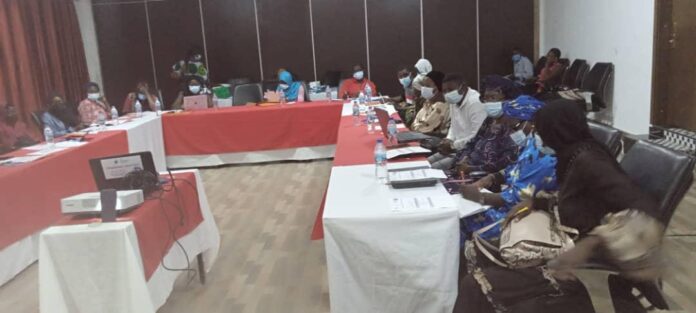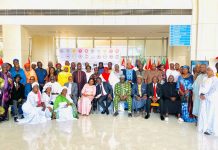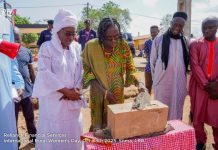By Mustapha Jallow
Officials of the West Africa Network for Peace building (WANEP), The Gambia on Monday trained fifteen (15) women from different regions across the country on political participation and leadership.
They also trained agents of the community on conflict prevention.
The 4-day training was aimed at increasing women participation in decision making processes at all spheres of development both national and regional. At the end of the 4th day, a Women Leadership Handbook (simplified) will be developed by the consultants with tips, tools and techniques for women leadership to be given to the participants from the regions.
Supported by the United Nations Development Programme (UNDP) through the Peacebuilding Fund, the training was held at a local hotel in Kololi on 17th August 2021.
The event was organised by WANEP in partnership with International Republican Institute (IRI), targeting 15 female participants comprising civil society, political parties, academia, and gender officers in KM, WCR, CRR, URR and LRR.
“Since women generate much of the country’s wealth, it only makes sense to empower them with additional skills so that the impacts of their efforts are more effective and targeted for what the country needs. From the local to the global level, women’s leadership and political participation are restricted by the patriarchal nature of society which reduces the role of women to house wives and caretakers,’’ remarked Salama Njie, National Coordinator of WANEP, while declaring her welcoming statement.
Madam Njie said according to national statistics, women constitute 51% of the population of The Gambia and produce 70% of the food. She said although the ratio of men and women is nearly equal, the women put more than their weight and that weight is power.
Njie said the overall women’s political and economic participation is low, stating that out of 58 members of the National Assembly, only 6 are women and 52 are men. Out of the 6 female parliamentarians, only 2 are elected and 4 nominated.
“This represents only approximately 11.5 % of total members of the National Assembly. At the level of the Executive, there are a total of 17 Ministers, out of the 17, only 4 are women. This represents approximately 23.5%. In the Judiciary, from the Supreme Court down to the Lower Courts, women represent approximately 48% of the Judges and Magistrates. There are no female chiefs out of the 44 chiefs, all male,’’ she explained.
“Women in every part of the world continue to be largely marginalized from the political sphere, often as a result of discriminatory laws, practices, attitudes and gender stereotypes, low levels of education, lack of access to health care and the disproportionate effect of poverty on women.’’
Speaking further, Madam Njie said an unhealthy blend of social, political, economic and sometimes even legal barriers hinder women’s participation in formal and informal politics.
At the end of the session, she said the trainees will embark on a 3-day step-down regional training, targeting women leaders from different sectors in the regions, including women leaders from community-based organizations, youth organizations, Village Development Committees (VDCs), ‘Yai Compins’, political parties and those interested in elective politics.
According to her, women leaders at the regional levels will be trained on requisite skills and knowledge needed to increase their level of confidence and abilities to take up leadership positions.
“I therefore urge the trainees to make good use of this 4-day training as it will go a long way in enhancing their capacities to serve as women leaders and candidates in their respective political parties and institutions,’’ she urged.
Speaking on behalf of UNDP’s Resident Representative in the Gambia, Yirah Mansaray, Governance Officer for UNDP said women and girls constitute more than half of the population of the country and yet they are under-represented in the organ of state that decides on issues affecting their lives.
He argued that: “Even when they gained representation, the influence of elected women is sometimes limited due to the centralisation to the party control in male dominated party leadership with political institutions dominated with gender-norms and procedure.”
For her part, Madam Robina Namusisi, Resident Country Director of IRI, highlighted the importance of women’s participation in political leadership training, saying that it would raise their political awareness as well as make them politically active.



















